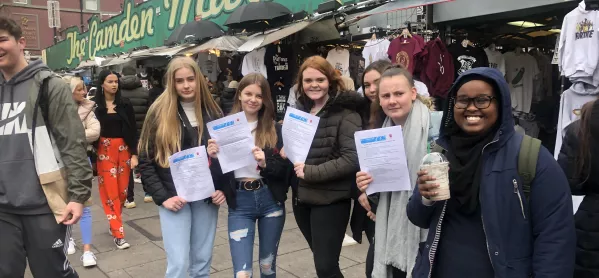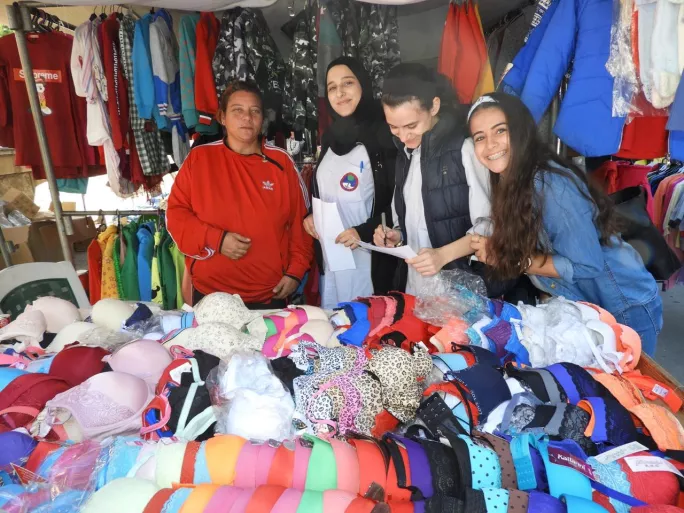- Home
- Why we Surfed the Street Markets to build global links
Why we Surfed the Street Markets to build global links

We live in a shrinking world.
This is why it’s crucial that teachers give young minds the opportunity to see beyond their environment, understand different perspectives, question things, and connect with other cultures and countries.
Not only does this motivate students and teachers, but it also gives them a sense of purpose and ambition, and enables them to see how they can make a positive impact on the lives of others across the world.
What is Surfing the Street Markets?
One way we have done this at Stantonbury International School, part of Griffin Schools Trust, is through a project with two schools in other parts of the world: Rawdah High School in Beirut in Lebanon and the CRPF Public School, Rohini in New Delhi, India.
The project we formed is an interactive international project where pupils connect with peers in other countries and local communities to learn how street markets contribute to Decent Work and Economic Growth, one of the United Nation’s Sustainable Goals.
How it works
Students in each participating school prepare survey questions before visiting their respective local street markets and interviewing vendors.
They asked questions on everything from their daily routines, the popularity of the market, its economic status, to the social, seasonal and financial challenges it faces.
Their findings are then collated and analysed using various statistical tools before being exchanged with their peers in partner schools through pen pals, emails and an ‘exchange box’ - a physical package sent by post, complete with home-made friendship bracelets.
Students then compare the results from the surveys, presenting these in an exhibition to showcase the projects to other students, staff, parents and carers at each participating school.
This led to some great moments of unique learning and collaboration. For example, our students visited Camden and were immersed in the sights, sounds and smells of a bustling London street market.
They interviewed stallholders to gain “insider knowledge” about the different ways the stalls are run, the family members many of them work alongside, and the loyal customer base they have built up - from booksellers to jewellery makers, and florists to clothing traders.
They were then able to compare their experience with that of their peers in Beirut and New Delhi really helped them to get a flavour of street markets in different countries - the exotic spices and opulent golds and purples in India, the vibrant fabrics in the Lebanese stalls - and how the communities in these countries also relied on their local street markets.

The benefits of Surfing
The Surfing the Street Markets project provided students with the opportunity to reflect upon and learn about their place in a globalised world by directly comparing their own experiences and findings with those of their international peers. It opens young minds to what life is like in other cultures, challenging stereotypes and expectations, revealing similarities as well as differences.
It also helps students - tomorrow’s workforce generation - to reflect on how social enterprise impacts on local and wider communities, and consider how they can help drive positive change in their own communities, for example by helping with food or other donation projects.
Collaborating with students in different countries brings global learning to life and helps to embed global thinking throughout the school culture.
Students can find it hard to understand what global learning is all about and what it is trying to achieve unless it becomes a real-life scenario.
By facilitating direct communication between students across very different cultures - through Skype, emails and document exchange platforms - you are making learning memorable, directly connecting it with real people and real experiences.
How to do it
Sign up to Connecting Classrooms and download its Decent Work and Economic Growth resource - one of its many free global learning resources containing creative and engaging project templates, lesson plans and activities on global issues and themes.
Find an international partner school to give your students an authentic global learning experience - you can create a link with a school in one of more than 30 countries across Africa, the Middle East and South Asia.
Encourage teaching staff and school leaders to take a training course to help deliver global learning - it’s free, a great motivator and an excellent professional development opportunity.
6 tips for success
- Ensure that all teachers are aware of the project - it’s an excellent opportunity for cross-curricular teaching that will help students to become fully immersed in the projects and really get the most out of a global learning experience. We set up a working group of teachers for international projects to maximise collaboration.
- Use the project as an opportunity to expand students’ knowledge of how the world works. To support Stantonbury students’ understanding of international enterprise, for example, we held class presentations to explain the concept of exchange rates, currencies used and how exchange rates fluctuate.
- Involve as many students as possible to maximise diversity within the project - the more different perspectives the better.
- Keep students engaged by linking the project to curriculum subjects at every opportunity and incorporating tasks into class or homework assignments.
- Set up a designated club to promote global learning - our international club runs after school and is an excellent forum for cultural enrichment and specific projects like Surfing the Street Markets.
- Motivate students to do their best by giving them something to aim for - we told students that their work would be showcased during our trip in front of the entire group of visitors, and they produced outstanding presentations.
Sandra Underwood is International Coordinator at Stantonbury International School in Milton Keynes, part of Griffin Schools Trust. The school was recently awarded the British Council’s International School Award in recognition of its work to bring the world into the classroom
Keep reading for just £1 per month
You've reached your limit of free articles this month. Subscribe for £1 per month for three months and get:
- Unlimited access to all Tes magazine content
- Exclusive subscriber-only stories
- Award-winning email newsletters